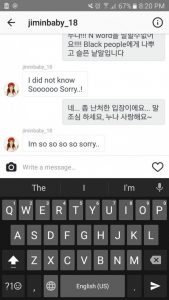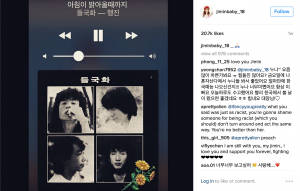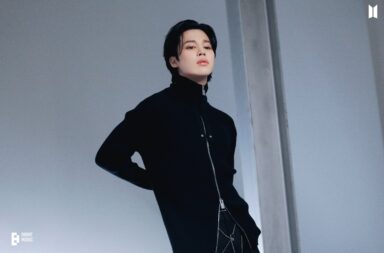 AOA’s Jimin recently came under fire for saying the N-word. Last week, she uploaded a cover of Nelly’s “Get Like Me” featuring Nicki Minaj and Pharrell Williams onto her Instagram, in which she was heard rapping the N-word. Controversy in the form of comments and shares quickly arose, with one fan even messaging Jimin directly on Instagram to tell the idol about her mistake in using this word. In response, she quickly apologised and deleted the the video.
AOA’s Jimin recently came under fire for saying the N-word. Last week, she uploaded a cover of Nelly’s “Get Like Me” featuring Nicki Minaj and Pharrell Williams onto her Instagram, in which she was heard rapping the N-word. Controversy in the form of comments and shares quickly arose, with one fan even messaging Jimin directly on Instagram to tell the idol about her mistake in using this word. In response, she quickly apologised and deleted the the video.
Regarding Jimin’s apology, I am rather impressed with how prompt her response was. Not only did she recognise and acknowledge her mistake almost immediately after the comments came in, she also apologised personally instead of waiting for her company to do damage control. When responding to the fan’s message on Instagram, she apologised multiple times in English, perhaps in an attempt for international fans to understand her words. This makes her apology seem more genuine and less distant, which is to be appreciated.
However, I am a bit puzzled at Jimin’s supposed apology post via Instagram. She uploaded a photo of her phone playing Deul Guk-hwa’s “Until The Morning Brightens” with an emoji of two hands clasped together. While the emoji is most likely symbolic of her asking for forgiveness, the photo just makes me confused. Perhaps it’s because that I don’t understand the song and its meaning, but I just don’t get the link between the photo and Jimin’s apology.
There has been a mixed response to her video and following apology: some have been quick to excuse and defend her actions, attributing this mistake to her lack of knowledge since she was doing a cover and was merely following the lyrics of the song. There are even a few that have gone so far as to question why the use of the N-word is so inappropriate and offensive.
On the other hand, many others have been quick to criticise her actions. While I agree that criticism is necessary in this case — the N-word is an ethnic slur which is extremely offensive to black people — I also find that pointless insults to Jimin are exactly that — pointless. It’s not doing good to anyone by calling her ‘stupid’. Instead, we should focus on educating her and those who do not understand the why the N-word should not be used. It is only through understanding and learning from our mistakes that positive change can come about.
 Unfortunately, this is not the first time that this sort of incident has occurred. Earlier this year in July, Bambam from Got7 was heard saying the N-word in passing. Of course, there are huge contextual differences between these two cases. Whereas Jimin’s case stems from her covering an American pop song, Bambam made this comment in passing to one of his acquaintances during an informal house party in Los Angeles. While Jimin intentionally uploaded the recording to her Instagram, Bambam was not aware that he was being recorded (which in no way excuses it either).
Unfortunately, this is not the first time that this sort of incident has occurred. Earlier this year in July, Bambam from Got7 was heard saying the N-word in passing. Of course, there are huge contextual differences between these two cases. Whereas Jimin’s case stems from her covering an American pop song, Bambam made this comment in passing to one of his acquaintances during an informal house party in Los Angeles. While Jimin intentionally uploaded the recording to her Instagram, Bambam was not aware that he was being recorded (which in no way excuses it either).
What they both have in common, however, is their prompt apology. Bambam immediately apologised on social media, taking full responsibility for his actions. He also received a temporary SNS ban, which shows that his company, JYPE, took his mistake extremely seriously (and rightfully so). In January, Seventeen found themselves in their first scandal for debated use/implication of the N-word, which sparked Seoulbeat’s own discussion on the word’s use in K-pop and K-hip hop.
Jimin is no stranger to facing criticism for her her socio-cultural remarks. In May of this year, right before their “Good Luck” comeback, she and Seolhyun were heavily bashed for their lack of knowledge on Korean history. On their variety show “Channel AOA”, the duo were challenged to identify important historical figures by their photos. When they came across Ahn Jung-Geun, a Korean independence activist who played a crucial role in fighting for Korean independence from Japanese occupation and who assassinated former Prime Minister and Resident-General of Japan Itō Hirobumi, they were unable to name the widely-known Korean figure. In fact, they gave several incorrect guesses, mistaking Ahn Jung-Geun to be Japanese, which only exacerbated the situation.
 In comparison to their history scandal, this N-word one seems to have received less attention and criticism from the local Korean public. This may be due to several reasons: first, the use of the N-word may be relatively less relevant to the local Korean public than the Korean history scandal. Locals may have less of an understanding of the gravity and the offensiveness of the word, whereas they may resonate more with not knowing an important figure who fought for their country’s independence. Second, this type of scandal — the inappropriate use of the N-word — occurs more frequently, and so the public may be more complacent towards its use. It is unfortunate, but the use of the N-word comes up regularly on TV shows like Show Me the Money.
In comparison to their history scandal, this N-word one seems to have received less attention and criticism from the local Korean public. This may be due to several reasons: first, the use of the N-word may be relatively less relevant to the local Korean public than the Korean history scandal. Locals may have less of an understanding of the gravity and the offensiveness of the word, whereas they may resonate more with not knowing an important figure who fought for their country’s independence. Second, this type of scandal — the inappropriate use of the N-word — occurs more frequently, and so the public may be more complacent towards its use. It is unfortunate, but the use of the N-word comes up regularly on TV shows like Show Me the Money.
Although Jimin’s intentions were most likely harmless, since she was doing a cover of the song and perhaps did not understand the the gravity of the word and the problems of saying it, this does not and should not detract from the seriousness of her mistake. As an idol and thus a public figure, it is her responsibility to avoid using such culturally inappropriate and offensive terms, particularly in public videos that can be viewed and heard by all. Jimin could easily have muted that particularly word or have just not rapped the N-word at all. While her response to this controversy is, for the most part, appropriate and the right thing to do, I sincerely hope that she learns from this scandal and avoids making similar mistakes in the future.
(Images via FNC Entertainment, Instagram, Twitter, Instiz, Nate [1][2])


